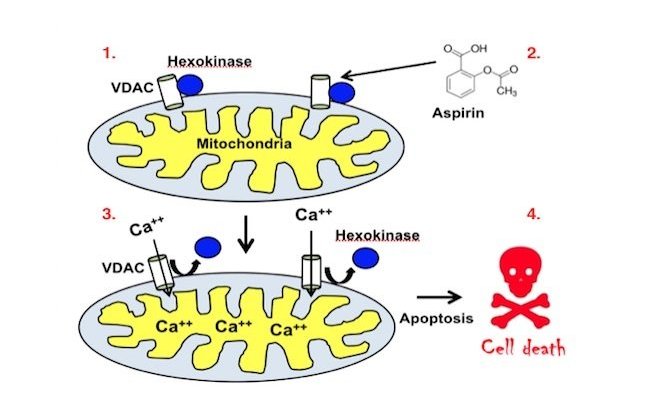
Aspirin, a non-steroidal anti-inflammatory drug (NSAID), is widely used as an antipyretic, analgesic and is also recommended for preventing stroke and ischaemic heart attacks. Now a group of scientists from Indian Institute of Technology, Madras (IIT‑M) have shown how aspirin can also cause cell death and therefore have possible implications in the treatment of cancer. The study was published in Scientific Reports.
Research in the last two decades has shown that a regular, preventative use of low-dose aspirin may reduce the risk of cancer. However, no clarity on the cellular processes that could possibly damage the cancer cells had been established.
The IIT‑M researchers have provided an insight into these very cellular processes. They show that aspirin interacts with mitochondria through voltage-dependent anion channel (VDAC), a membrane protein and causes cell death or apoptosis.
Cancer cells are highly proliferative and have a distinct advantage over normal cells in terms of metabolism. A key attribute of many cancers is the ability to metabolise glucose at an elevated rate, which aids growth and proliferation of cells. The rapid entry of glucose into cancerous cells is supported by Hexokinase II, an enzyme that gets strategically attached to VDAC– an entry point on the mitochondria.
Mitochondria’s major role at the cellular level is energy production in the form of ATP. The Hexokinase II bound to VDAC1 recruits the elevated glucose and gains energy from the mitochondrial ATP . This produces other critical metabolites that help cancerous cells proliferate and move beyond their origin to other places in the body, resulting in what doctors call metastasis.
Aspirin dissociates Hexokinase from the VDACs, which breaks the chain of elevated metabolism and hence prevents the growth of cancer cells. It also enhances the uptake of Ca+2 ions into the mitochondria, that ultimately leads to the death of cancerous cells.
Amal Kanti Bera, Professor, Department of Biotechnology at IIT‑M and one of the authors of the study, says, “our work will help in designing aspirin-based drugs which have a stronger anti-cancer effect and lesser side effect. We are also exploring the possibility of using aspirin in combination with other chemotherapy drugs to get the best result.”
Interestingly, a clinical trial to test if daily use of aspirin can prevent cancer relapse in patients who have previously been treated for early stage cancer is already underway at the Tata Memorial Hospital, Mumbai. Called ADD-ASPIRIN, the clinical trial presently involves 11,000 volunteers from India and the UK. The study is being jointly funded by Cancer Research UK, National Institute for Health Sciencesand Sir Dorabji Tata Trust.
Manju Sengar, a medical oncologist at the Tata Memorial Hospital, who is involved with coordinating the clinical trials in India, says, “aspirin has been in the clinic for quite a while now. Most patients in my practice are in the age bracket of 50 and beyond, and are already consuming aspirin for cardiovascular disorders, elevated lipid levels in the blood and other conditions. Clinical trials will establish if regular aspirin consumption and the subsequent prevention of cancer is co-incidental or there is a substantial correlation between the two.”
Commenting on the IIT‑M study, she says, “fundamental studies and clinical trials tend to run in parallel, with one corroborating from the other or even refuting the other for that matter”. It’s too early now to derive a conclusion about aspirin’s efficacy in cancer treatment.
Bera agrees that more clinical trials are needed and adds that, “aspirin is not effective against all cancers.” In individuals with mutations in the VDAC mitochondrial protein, the central element of his study, aspirin might be ineffective. He and his colleagues are now looking at developing ways to increase aspirin’s efficacy as an anti-cancer drug.